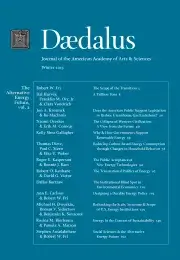Energy in the Context of Sustainability
Today and in the coming decades, the world faces the challenge of meeting the needs of a still-growing human population, and of doing it sustainably – that is, without affecting the ability of future generations to meet their needs. Energy plays a pivotal role in this challenge, both because of its importance to economic development and because of the myriad interactions and influences it has on other critical sustainability issues. In this essay, we explore some of the direct interactions between energy and other things people need, such as food, water, fuel, and clean air, and also some of its indirect interactions with climate, ecosystems, and the habitability of the planet. We discuss some of the challenges and potential unintended consequences that are associated with a transition to clean, affordable energy as well as opportunities that make sense for energy and other sustainability goals. Pursuing such opportunities is critical not just to meeting the energy needs of nine billion people, but also to meeting their other critical needs and to maintaining a planet that supports human life in the near and long term.
The term sustainability–widely used today in corporate, academic, government, nongovernmental, and community settings–is defined in multiple ways. In the corporate sector, sustainability typically refers to the triple bottom line, or “three-legged stool,” that incorporates concern for the economy, the environment, and social equity into industrial or economic activities. In development circles, the term often describes a pattern of development that “meets the needs of the present without compromising the ability of future generations to meet their own needs,”1 or that promotes human well-being while protecting and conserving the life support systems of the planet.2 Most biodiversity-conservation organizations embrace the strategy that the International Union for Conservation of Nature outlined in 1980 to integrate conservation and development objectives.3 Despite differences in these and other definitions, all share a common concern: to maintain the planetary resources needed to meet today’s needs as well as those of future generations.
No resource is more fundamental to human development and well-being than energy. Energy is a key ingredient of almost all aspects of human existence, from producing food, to accessing and purifying water, to heating and lighting homes, to transporting materials and people, to creating the goods and technologies that humanity has come to rely on. Therefore, human well-being depends on sustainable, reliable, and enduring forms of energy. Yet for many, access to affordable energy remains an aspiration: there are still billions of people worldwide who do not have access to electricity and modern forms of energy, and as a result, energy is among the most frequently cited sustainability challenges.4 As population growth combines with increased consumption patterns, demand for energy services will rise sharply.5 Moreover, access to reliable sources of energy–even in areas that have had access in the recent past–is a growing concern. Significant technical, economic, and national security issues affect the availability of fossil fuels–namely, coal, oil, and natural gas– that currently supply 82 percent of global energy and 85 percent of U.S. energy.6 The use of fossil fuels also has significant environmental impacts, including the production of pollutants that affect the health of people and ecosystems from local to global scales.
. . .
